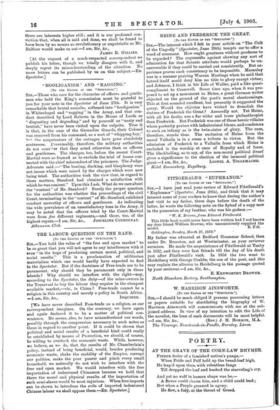THE LABOUR QUESTION ON THE RAND.
To THE EDITOR OP THE "SPECTATOR."] Sin,—You hold the value of "the free and open market" to be so great that you will not agree to any interference with it even "in the hope of producing certain moral, political, and social results." This is a proclamation of utilitarian materialism which one would hardly have expected to find in the Spectator. But if the doctrines of Free-trade are to be paramount, why should they be paramount only in these islands ? Why should we interfere with the right—nay, according to the Spectator, the duty—of the mine-owners in the Transvaal to buy the labour they require in the cheapest available market,—viz., in China ? Free-trade cannot be a religion in this country and merely a policy in South Africa..
[We have never described Free-trade as a religion, as our correspondent imagines. On the contrary, we have again and again declared it to be a matter of political con- venience. He seems, also, to have misunderstood our words, possibly through the compression necessary in such notes as these in regard to another point. If it could be shown that political and social results of a beneficial kind could really be established by means of Protection, we should, of course, be willing to overlook the economic waste. While, however, we believe, as we do, that the results of Mr. Chamberlain's policy, instead of being beneficial, would, besides producing economic waste, shake the stability of the Empire, corrupt our politics, make the poor poorer and pinch every small household, we naturally do, not wish to interfere with the free and open market. We would interfere with the free importation of indentured Chinamen because we hold that there the moral and physical results of the importation of such semi-slaves would be most injurious. .When free imports can be shown to introduce the evils of imported indentured Chinese labour we shall oppose them.—En. Spectator.]










































 Previous page
Previous page